|
|
|
Sort Order |
|
|
|
Items / Page
|
|
|
|
|
|
|
| Srl | Item |
| 1 |
ID:
088245
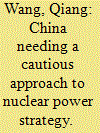

|
|
|
|
|
| Publication |
2009.
|
| Summary/Abstract |
China is leading the recent revival of nuclear energy programs. The Chinese government plans to increase nuclear generating capacity to 40 GWe by 2020, while the installed capacity is 8.6 GWe in 2007. In view of the enthusiasm shown for nuclear electricity throughout the country, the actual scale of Chinese nuclear power development is expected to reach 70 GWe by 2020. However, the low cost proven uranium reverses (cost category to <130 US $/kg) in China only meet half demand of 40 GWe capacity in 2020. And overlying China's increased demand is continued political sensitivity about the uranium trade. Meanwhile, the capacity of China's spent fuel reprocessing cannot keep up with the increasing spent fuel. And the legal administrative system of radioactive waste and spent fuel management is outdated. Hence it is proposed in this paper that the accelerated development of nuclear power industry is not good, and the over-accelerated development may be harmful, without appropriately considering the uranium resources and spent fuel management.
|
|
|
|
|
|
|
|
|
|
|
|
|
|
|
|
| 2 |
ID:
116921
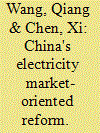

|
|
|
|
|
| Publication |
2012.
|
| Summary/Abstract |
The market-oriented reform in electricity industry has become a global trend since 1980s. Although China's electricity industry has been reformed since 1978, the substantial reform has not been conducted until 1985. Before 1985, China's power industry had been absolutely monopolized by the central state-owned companies. The absolute monopoly has been broken since 1985, when the Chinese government opened doors for non-central state-owned investment entities and foreign investors in power supplies in order to solve the chronic power shortage. In 2002, the comprehensive electricity reform plan entitled Scheme of the Reform for Power Industry was enacted. However, implementation of this plan was delayed due to electricity supply shortages. Even worse, a new kind of monopoly has been developed under the background "the state advances, the private sector retreats" in late years. In some sense, the former absolute monopoly has transformed the current relative monopoly. We contend that the relative monopoly has reversed the market-oriented reform in China's electric industry. If the relative monopoly remains unchanged, it will be harmful to public welfare.
|
|
|
|
|
|
|
|
|
|
|
|
|
|
|
|
| 3 |
ID:
127234
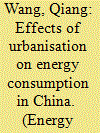

|
|
|
|
|
| Publication |
2014.
|
| Summary/Abstract |
As a key issue in China's economic development, urbanisation creates increasing pressure on energy supply and the natural environment. Thus, a better understanding of the relationship between urbanisation and energy consumption is necessary for Chinese decision makers at various levels to address energy security and sustainable economic and social development. This paper empirically investigates the effects of China's urbanisation on residential energy consumption (REC) and production energy consumption (PEC) through a time-series analysis. The results show that compared with rural areas, urbanisation slows per capita REC growth because of the economy of scale and technological advantages associated with urbanisation but has greater promotional effects on the growth of REC and the improvement of REC structure. The economic growth caused by urbanisation most significantly contributes to an increase in PEC, whereas technological advancement was found to reduce the scale of PEC (except from 2001 to 2005). Finally, the structural effect of the energy supply increased rather than decreased China's PEC, and the effect of industrial structure adjustment on PEC was found to be insignificant.
|
|
|
|
|
|
|
|
|
|
|
|
|
|
|
|
| 4 |
ID:
166394
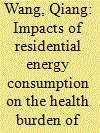

|
|
|
|
|
| Summary/Abstract |
Knowledge about the links between burden from household air pollution (B-HAP) and residential energy consumption (REC) is essential for optimizing residential energy supply mix and improving the quality of indoor air worldwide. However, the literature on this topic from a perspective of energy transition is still lacking. This study investigates the relationship between the variation in the B-HAP and the structural transition of REC using cross-sectional data of 135 countries during 1990–2015. The results indicate that countries with high B-HAP are clustered in Africa and Asia, which are mainly middle- and low-income countries. Meanwhile, with the structural transition of REC, the global B-HAP has exhibited a decreasing trend. Moreover, the findings show that residential electricity use has a greater impact on B-HAP reduction than other household fuels. Although the impacts of liquefied petroleum gas usage changed considerably during the study period, its contribution to reducing the B-HAP remains highly significant, while household natural gas use exhibited a significant and stable effect on B-HAP reduction. In contrast, solid biomass use showed an increasingly adverse impact on the B-HAP, and the impact of coal use on the B-HAP became statistically significant since 2010, with an increasing trend.
|
|
|
|
|
|
|
|
|
|
|
|
|
|
|
|
| 5 |
ID:
088247
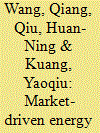

|
|
|
|
|
| Publication |
2009.
|
| Summary/Abstract |
China's rapid economic growth has strained its power supply, as manifested for instance by the widespread 2008 power shortage. The cause for this shortage is thought to be the current Chinese energy pricing system, which is mainly government rather than market controlled. Government-regulated price-caps for coal have seriously affected coal supply. At the same time price-caps for electricity supply have caused suspension of power plant operation. As a result, the average operating time of coal-fired power plants declined 50 h annually across the nation in the first half of 2008 compared to the previous year, despite clear power shortages. Here, it will be suggested that energy pricing, set by supply and demand may effectively discourage excessive growth in heavy industry, substantially encourage energy conservation and efficiency, and curb the rapid electricity demand in China. It will be argued that a market-oriented electricity pricing mechanism is required for China to secure its future power supply.
|
|
|
|
|
|
|
|
|
|
|
|
|
|
|
|
|
|
|
|
|